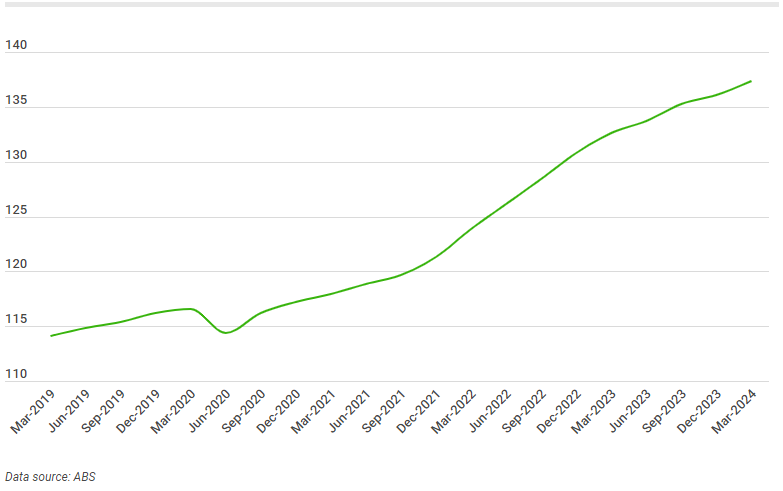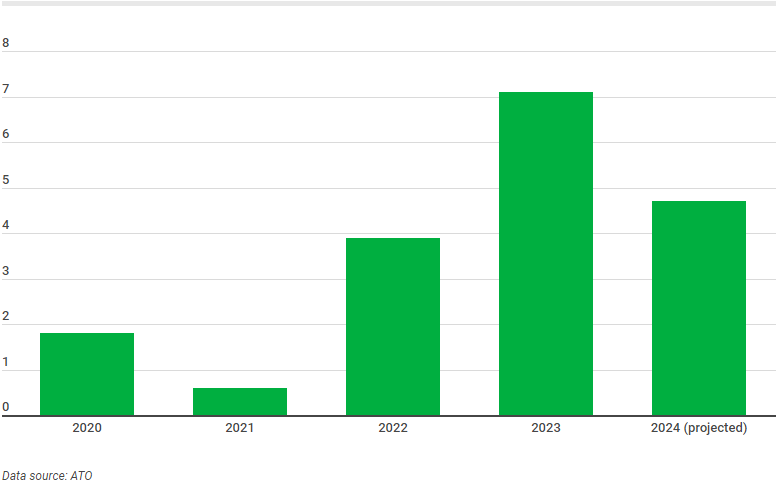The latest inflation figures have been revealed, providing much-awaited relief for the three-million Australians holding HECS-HELP debts.
- The latest inflation data has set the stage for a 4.7% increase in HECS debts effective from June
- It comes after HECS debts soared 7.1% on the back of rampant inflation last year
- Prime Minister Anthony Albanese has hinted at potential changes in the upcoming Federal Budget that might address growing concerns over rising HECS debts
Although these debts don't accrue interest, they do adjust annually in line with inflation.
Many will remember their student debt exploding 7.1% in June 2023.
Fortunately, this year’s punch, while still significant, likely won’t leave such a bruise.
Australia saw a 3.6% bump in inflation over the 12 months to 31 March, according to figures released by the Australian Bureau of Statistics (ABS) on Wednesday.
The 1% quarter-on-quarter rise was largely driven by costs related to education (+5.9%), health (+2.8%), housing (+0.7%), and food (+0.9%).
Education fees rise at the start of each calendar year, with 2024 bringing the strongest quarterly rise since 2012.
As per the Higher Education Support Act 2003, the rate at which HECS-HELP debts are indexed is calculated by combining the Consumer Price Index (CPI) numbers for the four quarters to March and dividing that by the same figure for the previous year.


With the March All Groups CPI number locked in at 137.4, we can now assert that indexation in 2024 will likely come in at 4.74%.
That’s assuming the formula used in the calculation is the same this year as it was in previous years.
Research from the Parliamentary Library, commissioned by the Greens, found indexation of 4.2% to 4.8% would add between $1,113 and $1,272 to the average HECS debt.
Prime Minister hints at changes to HECS-HELP system
Whether HECS-HELP debts will be indexed as expected in 2024 is yet to be confirmed.
Prime Minister Anthony Albanese recently hinted that the upcoming Federal Budget could bring relief for anxious HECS-HELP debt holders.
“There's a range of areas where we need to do much better with the younger generation basically, and HECS is one of them,” Mr Albanese told radio station HIT Central Queensland last week.
“We’ve received a review of that … and what that has said is that the system can be made simpler and be made fairer.
“The idea of HECS is a good one. It's one that has led to a massive expansion [in] the number of people being able to do university degrees.
“But we're examining the recommendations and we'll be making announcements pretty soon on that. We, of course, have a budget coming up.”
The 2024-25 Budget will be handed down by Treasurer Jim Chalmers on 14 May and, at this rate, three million sets of eyes will likely be scouring it for HECS-related news.
Should we change how HECS-HELP debts are indexed?
Calls for HECS debts to be indexed at the lower of CPI or the Wage Price Index (WPI) going forward have emerged in recent times, with the push led by independent MP Monique Ryan.
However, the impact of such a change if applied historically would have been relatively negligible, according to modelling.
“[Looking] back over the last decade … about two thirds of the time, wage price growth was less than CPI,” Life Sherpa CEO and co-founder Vince Scully told the Savings Tip Jar podcast earlier this month.
“The modelling that we did contrasting the existing CPI index indexation to the lower of wages [growth] or CPI would have made about $180 a year difference on the average HECS balance of $26,000.”
“It's not a material change – you'll win some, you'll lose some – and I think it misses the opportunity to do a bit of a root-and-branch reform to the whole HECS-HELP system.”
The Greens are taking it one step further, calling for the indexation of HECS debts to be scrapped entirely.
“Student debt can’t be fixed because student debt shouldn’t exist,” Australian Greens deputy leader and spokesperson for education Mehreen Faruqi said.
“But at the very least, it shouldn’t be increasing at such a ridiculous rate.
“University and TAFE should be free and all student debt wiped.
“But let’s start with abolishing indexation and providing some relief to people being weighed down by an ever ballooning debt.”
I want to buy a house. Should I pay off HECS first?
If you're eyeing your first home purchase, understanding the impact of your HECS debt on your home loan application is crucial.
Many potential buyers face the dilemma of choosing between reducing their deposit or paying down student debt.
Mr Scully explains banks and lenders typically don’t care about the existence of a HECS debt, but they are interested in how these debts reduce a person’s take-home pay.
Australians with HECS-HELP debts are required to repay their balance once they earn above a certain threshold, with employers typically removing HECS repayments prior to handing over a person’s salary.
In the upcoming financial year, that threshold will be $51,550.
Repayment rates also scale with income.
For example, those earning over $151,201 will contribute 10% of their wage towards settling their HECS debts.
Consequently, HECS debt can indeed reduce your borrowing capacity by lowering the net income considered by lenders.
"2024 HECS-HELP update: Prepare for a 4.7% increase in June" was originally published on Savings.com.au and was republished with permission.
